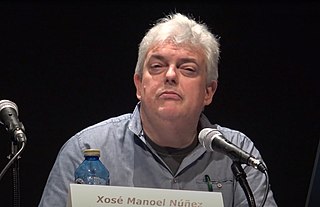Espasa-Calpe was a Spanish publisher which existed during the 20th century. It was created in 1925, by the union of Editorial Calpe, founded by Nicolás María de Urgoiti in 1918, and Editorial Espasa, founded by José and Pau Espasa i Anguera in 1860.

Iris M. Zavala was a Puerto Rican author, scholar, and poet, who later lived in Barcelona, Spain. She had over 50 works to her name, plus hundreds of articles, dissertations, and conferences and many of her writings, including "Nocturna, mas no funesta", build on and express this belief.

Manuel Senante Martínez (1873–1959) was a Spanish Traditionalist politician and publisher, until 1931 adhering to the Integrist current and afterwards active in the Carlist ranks. He is known mostly as the longtime editor-in-chief of the Madrid daily El Siglo Futuro (1907–1936). During 8 consecutive terms he served as the Integrist deputy to the Cortes (1907–1923).

Integrism was a Spanish political philosophy of the late 19th and early 20th century. Rooted in ultraconservative Catholic groupings like Neo-Catholics or Carlists, the Integrists represented the most right-wing formation of the Restoration political spectrum. Their vision discarded religious tolerance and embraced a state constructed along strictly Catholic lines; the Integrists opposed Liberalism and parliamentarian system, advocating an accidentalist organic regime. Led first by Ramón Nocedal Romea and then by Juan Olazábal Ramery they were active as a political structure named Partido Católico Nacional, but the group retained influence mostly thanks to an array of periodicals, headed by the Madrid-based El Siglo Futuro. Though Integrism enjoyed some momentum when it formally emerged in the late 1880s, it was soon reduced to a third-rate political force and eventually amalgamated within Carlism in the early 1930s.

Maurism was a conservative political movement that bloomed in Spain from 1913 around the political figure of Antonio Maura after a schism in the Conservative Party between idóneos and mauristas ('maurists'). Its development took place in a period of crisis for the dynastic parties of the Spanish Restoration regime. The movement, which fragmented in several factions in the 1920s, has been portrayed as a precursor of the Spanish radical right.

Eduardo González Calleja is a Spanish historian, professor of Contemporary History at the Charles III University of Madrid (UC3M). He is the author of a long list of scholar works dealing with political violence.

Eduardo Ortega y Gasset (1882–1965) was a Spanish politician, journalist and lawyer.

José Álvarez Junco is a Spanish historian, emeritus professor of the History of Thought and Political and Social Movements at the Complutense University of Madrid (UCM). He is an expert in the study of the nation-building of Spain, nationalisms and the anarchist movement.
Julio Gil Pecharromán is a Spanish historian, specialising in the political history of 20th-century Spain.

Xosé Manoel Núñez Seixas is a Spanish historian who specializes in nationalism studies, the cultural history of war and violence, and migration studies.

Ángel Bahamonde Magro is a Spanish historian. He is professor of Contemporary History at the Charles III University of Madrid (UC3M).

Benito Pabón y Suárez de Urbina was an Andalusian lawyer, trade unionist and member of the Congress of Deputies of Spain for the city of Zaragoza during the last legislature of the republican period. He was a lawyer of the workers and peasants of the CNT, later becoming part of the trentista current - first joining the Federal Democratic Republican Party and later the Syndicalist Party.
The X Army Corps was a military formation belonging to the Spanish Republican Army that fought during the Spanish Civil War. During the war it was deployed on the fronts of Aragon, Segre and Catalonia.
The Anarchist Organization of the Spanish Region was an anarchist organization founded in 1888 during the last congress of the Federation of Workers of the Spanish Region (FTRE), held in Valencia. It had an ephemeral life as it disappeared the following year.
La Federación was a periodical publication published in Barcelona during the Sexenio Democrático.

The Valencia Conference was a secret meeting of the delegates of the Spanish Regional Federation of the International Workingmen's Association (FRE-AIT) held in Valencia in September 1871, during the reign of Amadeo I. It was held in secret due to the persecution it suffered and organized as a consequence of the panic caused by the Paris Commune among the European governments and ruling classes.
Guillermina Rojas y Orgis was a Spanish teacher, anarchist, and feminist. She was included as a character in Benito Pérez Gáldos' novel Amadeo I, part of the National Episodes.
Libertad was a Spanish newspaper published in Valladolid between 1931 and 1979. Originally founded by the fascist leader Onésimo Redondo as a weekly of fascist, pro-Nazi and anti-Semitic ideology, during the Civil War it became a daily newspaper. It continued to be published until its disappearance in 1979, after the end of the Franco regime.

Marcelino Domingo Sanjuán was a Spanish teacher, journalist, and politician who served as a minister several times during the government of the Second Spanish Republic.

The Brigades of Navarre, also known as Navarrese Brigades, were six brigades composed mainly of Navarrese requeté that participated in the Spanish Civil War. They constituted the main nucleus of the Nationalist Army that carried out the Biscay Campaign, including the decisive battle of Bilbao. Once the brigades won the War in the North, they became divisions.










